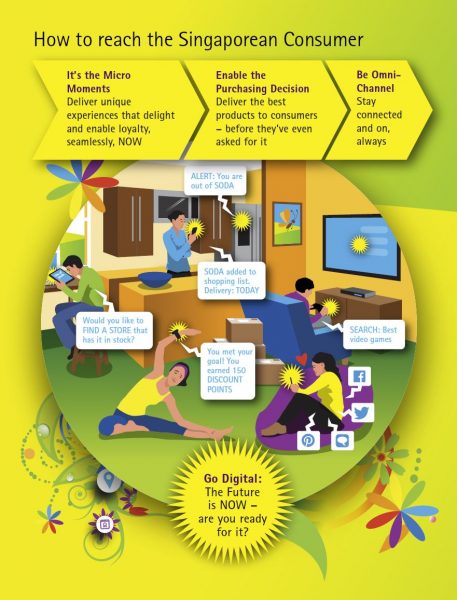
Going digital is the buzzword today with enterprises rushing to rethink their processes by connecting up in new ways to enhance a customer’s experience.
This is especially true for companies selling consumer goods. With intense competition on the way, the winners will be ones that provide a “hassle free” experience and anticipate what customers want, according to a recent Accenture study.
The consultancy firm says those who know their customers well will be able to grab a slice of the booming US$340 billion growth in the consumer packaged goods market in Asia-Pacific by 2020.
Key to this is how these companies do business over the Net, through digital commerce. The consumer experience is an area where they can and have to improve on, says Mohammed Sirajuddeen, managing director for Accenture Digital, in this month’s Techgoondu Q&A.
(NOTE: The responses have been edited for brevity and house style)
Q: We have seen a lot of industries try to emulate the Uber model and offer the same seamless, “hassle-free” service. Which type of services would lend themselves naturally to this?
A: Every industry wants to emulate the seamless, “hassle-free” service. From an industry perspective, consumer packaged goods companies are best placed to play the role of an aggregator due to their relationship with retailers.
Services such as logistics, especially demand fulfilment (last mile delivery), are emerging as a space which would naturally lend to this as it is still heavily under-utilised.
Take for example, a scenario where the consumer has a shopping list but is constrained by a lack of access or time, and another person with access to a vehicle, who has 15-20 minutes to spare and is nearby.
By connecting Demand with Supply through a mobile platform, one can monetise this whole cycle. Assuming safety and security aspects are properly covered, this could emerge as the next space that would be digitally disrupted.
This could prove to be a game changer, especially in developing markets whereby the last mile challenge is a key restraint for participants.
Q: What are these “micro moments” that companies need to figure out to engage consumers more closely through? How do they sense these moments?
A: Purchase journeys are getting shorter and consumers seek solutions to real-life moments almost instantaneously. Decisions are being made in micro-moments, when they are on the go, when they get home from work, when they are talking to friends.
Companies that are present in these micro-moments where decisions are made will be able to capture the “consumer’s basket”
They can analyse Google, Amazon and Alibaba a little more to see how they are able to sense micro-moments before consumers expressly ask for something.
Based on Accenture’s research, we know the consumer journey by category. This will help provide companies insights and enable them to identify the micr omoments and combine with media buying habits.
Q: Particularly in Singapore, how do you personalise the e-shopping experience for each consumer? Some might want to be engaged all the time, while others might only want to shop when they’re free on weekends.
Behavioural marketing strategies are become more common in Asia-Pacific. When trying to deliver the right message, to the right person, at the right time, digital marketing can help a lot with the latter two elements.
Most consumers usually fall within two to four segments, depending on their past purchase behaviour. This is High Value – High Frequency, High Value – Low Frequency, Low Value – High Frequency and Low Value – Low Frequency.
It is important to segment them or their purchases to identify what drives each segment to shop. From there, companies can then personalise the journey, for all or one segment, especially if this one segment accounts for majority of a company’s purchases, to enhance the customer experience.
Based on Accenture’s research, Singapore consumers do not consider shopping for consumer packaged products as a delight. It is seen as a necessity and driven by convenience. Hence, there is a fairly good retail landscape, and the potential touch points are click and collect/subscription models.
Q: How can online retailers in Singapore compete with the Amazons and Alibabas of the world, who have more resources to provide this enhanced customer experience?
In Singapore, there is an opportunity for click and collect. Redmart and Fairprice are starting to do this – and as we have seen from the Alibaba/Flipkart India experience – once consumers get used to logging on to a particular site and enjoying a seamless delivery process, they do not switch to other retailers. It becomes a habit.
Another interesting finding from our research is that there is a well-developed retail landscape, and consumers would like online intervention for increased time savings. For example, to click on purchases as you are on the go and collect on the way back.
Today, larger retailers are threatened by a host of startups, who are smaller, nimbler, more agile and growing at a faster rate.
These digital disruptors are changing the game across the retail value chain, and it is critical to forge partnerships with such niche players to win the game.






